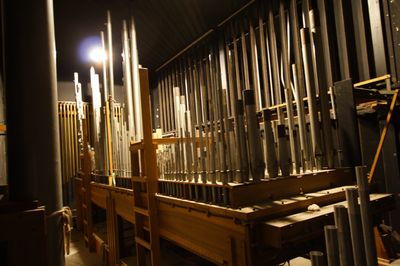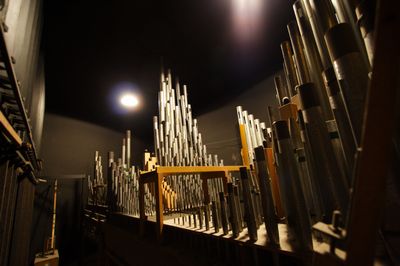| List of Pipe Organ Profiles | Pipe Organ Profiles Home | N8RRB Home | E-mail the Webmaster |
| Mershon Auditorium - 3/67 Schantz | Main Page | Great Division | Swell Division | Choir Division | Pedal Division | Console | Other Photos | Stop List |
Mershon Auditorium
Columbus, OH
3/67 Schantz
1957
Photos of the Choir Division
Click on the photo to see a larger image
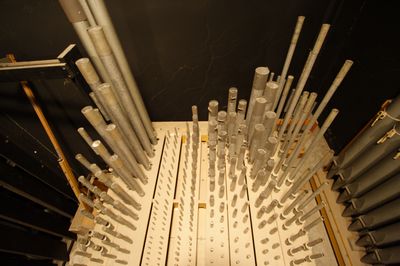 |
Here is a view from above. The wall straight ahead is the side wall furthest from the stage. Ranks from left to right are Schalmey, Principal, III Cymbal (four rows of very tiny pipes), Siffloete, Largiot, Tierce, Block Floete and Krummhorn. On the floor in back somewhat out of view are more pipes from the Schalmey rank, and to the far right is the Quintaton. Also note on the left side the wood lever which moves the expression shutters, another signature item of Schantz. | ||||
 |
Here's another view of the same ranks of pipes noted above. This is looking toward the center of the chamber and toward the stage. | ||||
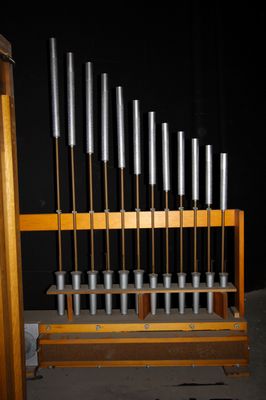 |
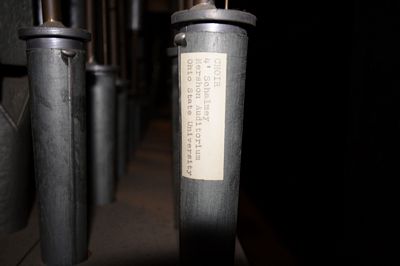 |
||||
| The
Schalmey or Rohr Schalmey is one of the more unique looking pipes. The
pipes resemble giant metal bottle rockets, but its sound is not very
explosive. This reed rank has a bright but thin sound.On the right is
one of the few labels found on any of the pipes in the organ. |
|||||
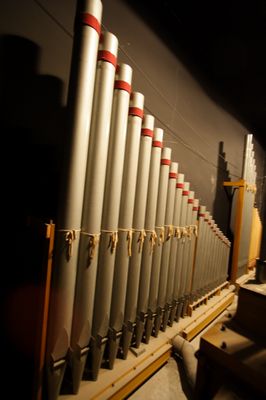 |
Here's
a better look
at the back wall. The pipes with strings around them are the Quintaton
rank, with the shorter pipes with no strings being part of the
Quintadena rank. The ranks not only have similar spellings, but
|
||||
 |
This is a look at the other ranks in the Choir. From left to right are Nazard, Koppelfloete (green felt), Nasenfloete (wood), Unda Maris, Viola, Dulciana, Quintadena (red felt) and Major Trumpet. | ||||
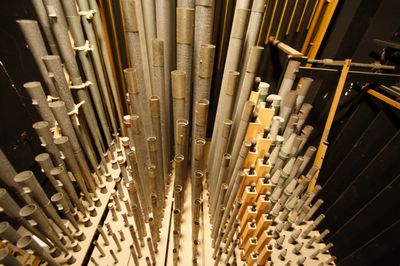 |
This is another view of the same ranks noted above. Again note the wood arm on the right side which moves the expression shutters. Also in view are the Chimes against the wall. This wall separates the Choir from the Great/Pedal chamber. | ||||
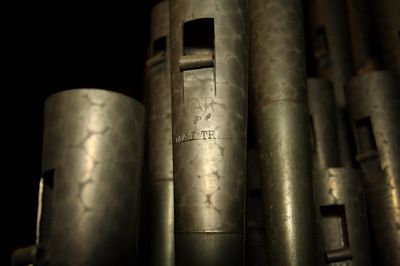 |
The Major Trumpet is the only non-Pedal Division rank in the organ at a higher wind pressure. This rank is on 8" of wind instead of 3 1/2" that everything else is on. As a result it's volume is louder than what a trumpet rank would normally sound like, but still quieter than a horizontal trumpet (trompete en chamade). | ||||
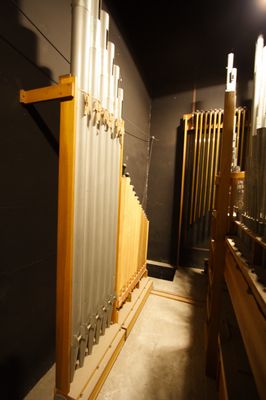 |
Along the back wall are the six largest pipes of the 8' Viola rank (metal), and the 12 largest pipes of the 8' Nasonfloete rank (wood). Also visible are the chimes against the back wall, and the entrance into the chamber through the floor. | ||||
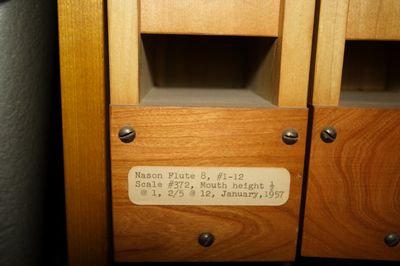 |
Here's a close up of the Nasonfloete CC pipe.Just like what was written on the wall in the Swell Division, the finisher from Austin wanted everyone to know who performed the final tonal adjustments and what the wind pressure was. | ||||
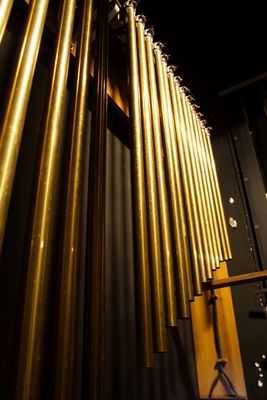  |
Against the wall closest to the stage are the Chimes. The console does not have a dial for increasing/decreasing the hammer intensity meaning that the only way to vary the volume is by opening or closing the expression shutters. Interestingly, the original organ specs have the Chimes in the Great Division rather than in the Choir. | ||||
 |
 |
||||
| There are three air reservoirs in the Choir Division. The chest on the left is well over 3' long and almost 4' wide, and provides air for most of the ranks. The chests on the right feed the pipes along the wall. | |||||
